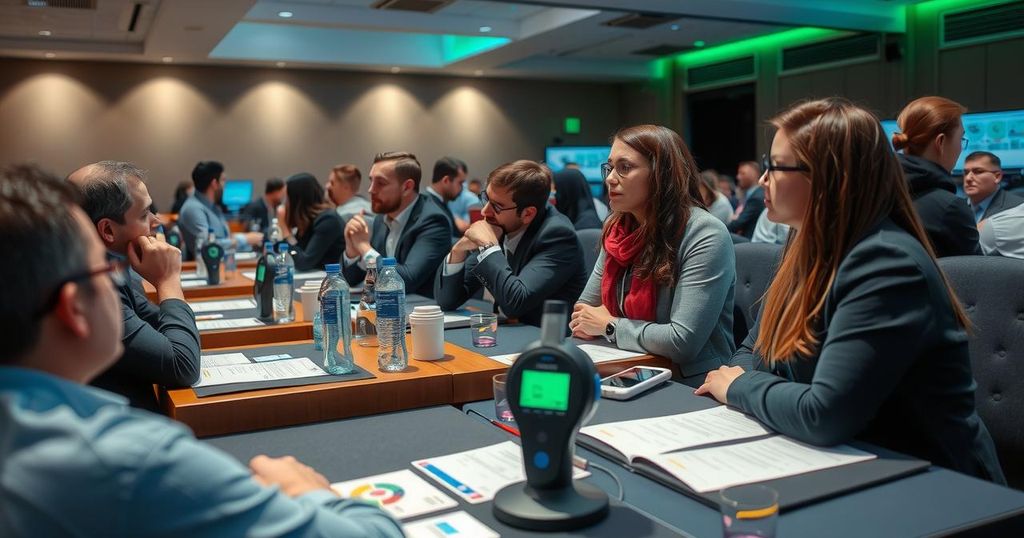This article reflects on the experience of attending COP29, highlighting the author’s personal journey, the significance of climate finance for developing nations, and poignant narratives from individuals affected by climate change. It discusses the need for larger financial commitments against the backdrop of historically sluggish international climate negotiations, positing that despite challenges, collective grassroots efforts remain vital to achieving climate justice.
In a reflective exploration of COP29, the United Nations Climate Change Conference held in Baku, Azerbaijan, a concerned participant grapples with the extensive climate crisis threatening both current and future generations. Drawing from the wisdom of Wendell Berry, they recount personal efforts to find solace in nature while recognizing the necessity for large-scale action that transcends individual efforts. Their journey to COP29 ignited curiosity about governmental commitments amidst a backdrop of skepticism regarding the effectiveness of international negotiations against the magnitude of the crisis.
The author provides a succinct history of the Conference of the Parties (COP), elucidating its origins at the Earth Summit in 1992 and detailing the evolution of negotiations across subsequent years, culminating in COP29. Despite the complexities surrounding climate finance, particularly for developing nations disproportionately affected by climate change, the author emphasizes the need for urgent funding, as the projected costs to meet necessary mitigation and adaptation goals amount to approximately $1.3 trillion.
During the conference, the author engaged closely with other participants and witnesses powerful narratives that humanize the statistics surrounding climate change. Stories from individuals such as Jocabed from Panama, Litara from Samoa, and Dorcas from Kenya highlighted the profound impact of climate change on culture, identity, and daily life. These accounts illustrated the real-world implications of political decisions, challenging the notion of climate refugees as merely logistical evacuees rather than individuals facing existential crises.
Despite the consensus reached, aiming for $300 billion in climate financing by 2035, many at COP29 recognized the inadequacy of this sum relative to the scale of need, particularly expressing concerns regarding the potential influence of national politics, such as the United States’ previous withdrawal from the Paris Agreement. The author expresses a complex emotional response upon returning home, oscillating between skepticism regarding the COP’s efficacy and inspiration derived from the resilience of the individuals they met.
Ultimately, they affirm the importance of grassroots movements and emergent leadership in the climate change dialogue. Valuing the contributions of those often marginalized in discussions makes clear that collective action, however small, is crucial in the pursuit of climate justice and sustainability. The journey of personal involvement and the broader coalition for change highlight an important intersection of hope and responsibility in confronting the climate crisis.
The article delves into the complex landscape of global climate negotiations as represented by COP29, emphasizing both the scale of the climate crisis and the need for substantial financial commitments to aid developing nations. The author contextualizes the significance of COP meetings, explaining their origins and the progressive evolution of international climate policy since the Earth Summit in 1992. The necessity for substantial funding to address climate change effectively is juxtaposed against personal narratives that underscore the human stakes involved, illustrating the real-world consequences of political decisions on vulnerable communities worldwide. This exploration invites a critical examination of the effectiveness of international dialogue amid pressing environmental challenges that require immediate, yet sustained, action.
In conclusion, the experience at COP29 illuminated both the challenges and the resilience found within the global climate movement. While the final agreement established a goal that many perceived as insufficient, the narratives shared by participants brought a personal dimension to the otherwise abstract negotiations. There emerges a shared understanding that individual and collective actions, rooted in community and advocacy, must coexist in the fight for climate justice. Looking ahead, the author chooses to draw inspiration from global voices advocating for change, reaffirming that hope can be nurtured through grassroots efforts intertwining with institutional dialogues.
Original Source: reformedjournal.com






